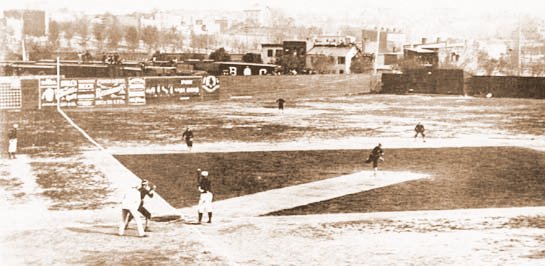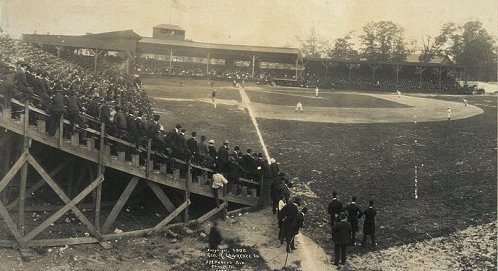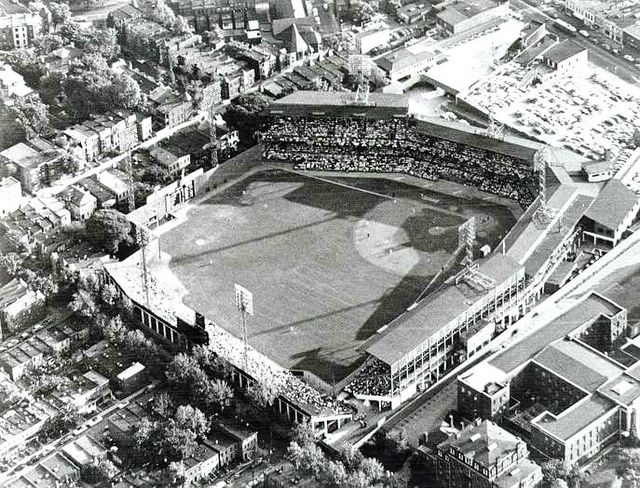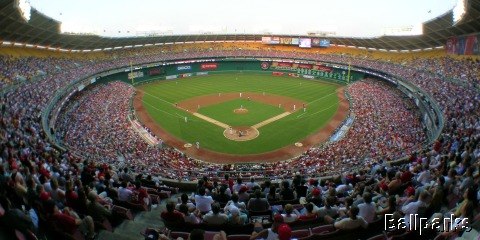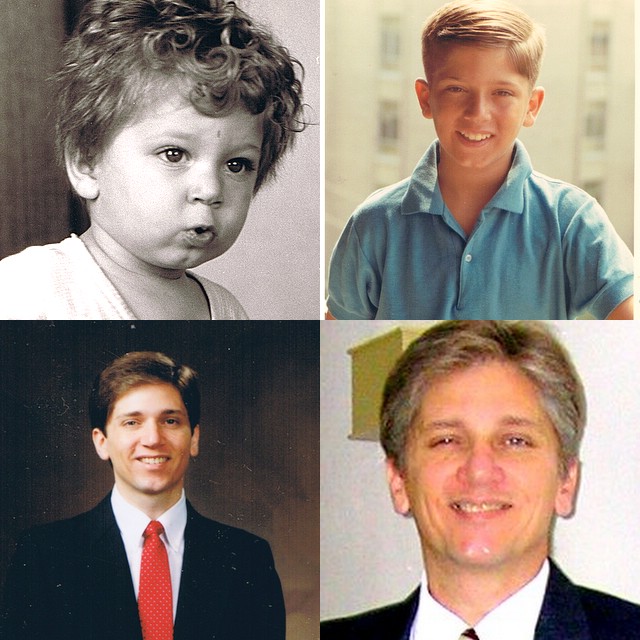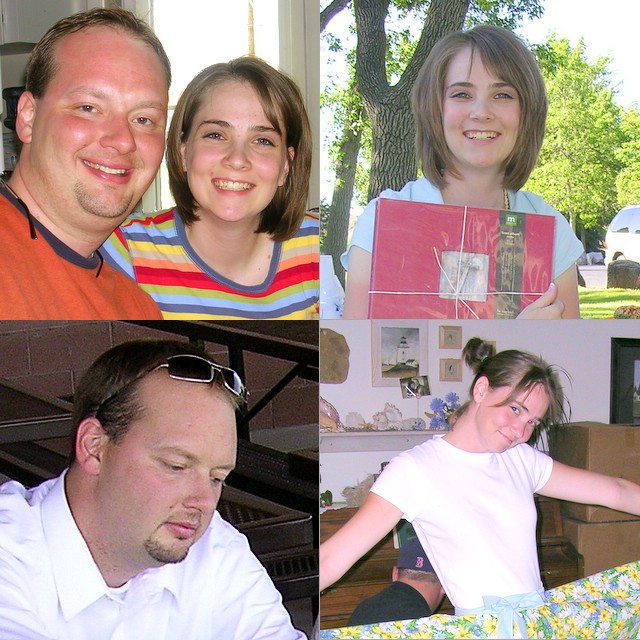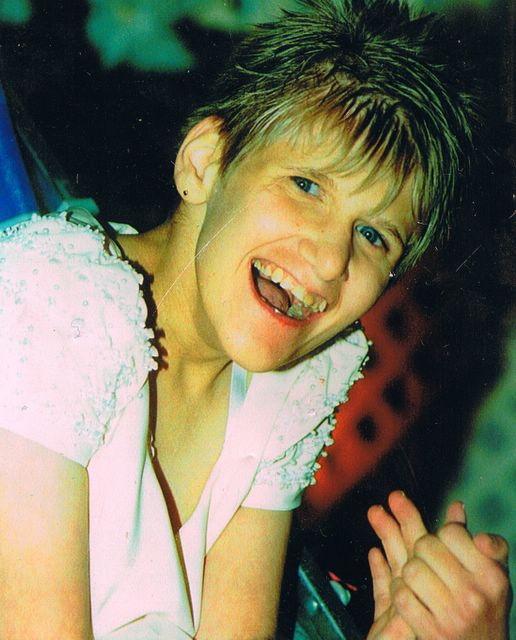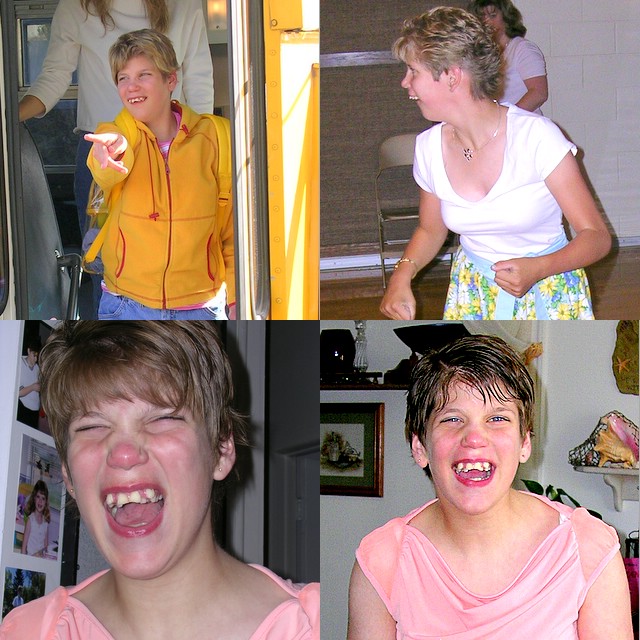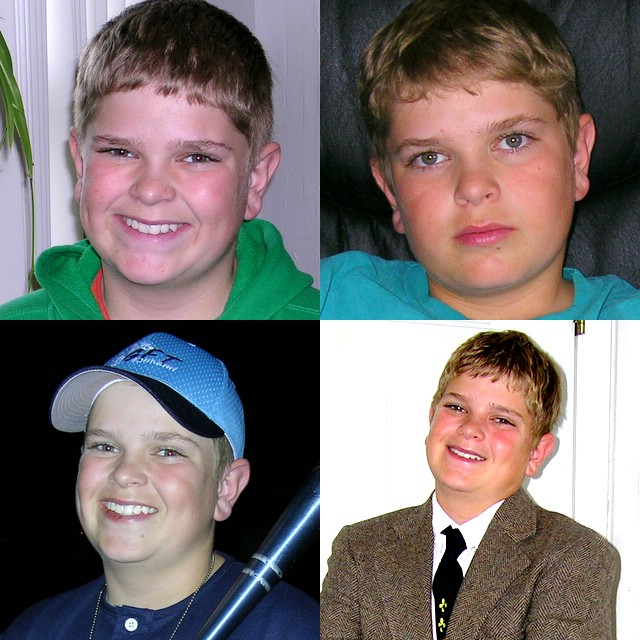BOWDEN TO STAY
 [July 1st] -- Bill Ladson reported on Friday that Stan Kasten has signed Jim Bowden to a multi-year deal. Kasten will not divulge how long the deal will last, but Ladson hinted that Bowden will be around long enough to see Chris Marrero and the rest of this year's draft to make it to the big leagues.
[July 1st] -- Bill Ladson reported on Friday that Stan Kasten has signed Jim Bowden to a multi-year deal. Kasten will not divulge how long the deal will last, but Ladson hinted that Bowden will be around long enough to see Chris Marrero and the rest of this year's draft to make it to the big leagues.
Sigh.
I can think of no words that will properly describe how I am feeling at this moment. We, the loyal fans of the Washington Nationals, see with clarity that Bowden, while a decent enough guy, isn't the long-term answer for this team.
Several bloggers have broken down Bowden's trades over the years. A few months ago, I tracked every deal he made with the Cincinnati Reds. The conclusion reached was that the great majority of his transactions were meaningless (minor leaguer for minor leaguer, for example), and the big ones usually back-fired on the team. The Ken Griffey trade with the Mariners comes to mind, as does the Roberto Kelly for Paul O'Neill fiasco a few seasons earlier. The Cristian Guzman signing wasn't the best way to start the Bowden era in Washington. Even disinterested fans knew that a great part of Cristian Guzman's batting average came from the fast Astroturf at the Metrodome. And while the Soriano trade still tilts Washington's way at this point (Galaraga is getting hit pretty hard at the 'AA' level and Termel Sledge, since traded to San Diego, played poorly and was optioned to the team's 'AAA' affiliate), the Rangers will have Brad Wilkerson's rights after this year. In essence, it was a three-for-one trade for a guy who would be, at best, a one-year rental.
And all of this makes Bowden the "best man for the job?"
So, what's worse: Bowden staying as the team's general manager for the foreseeable future, or Stan Kasten somehow thinking that his staying is a good thing? The only way this makes sense is if Kasten and the Lerners are ready to slash and burn the team, and figure that Bowden can't possibily screw the team up any worse.
And that couldn't be happening. Could it?
YOU ARE ABOUT TO ENTER THE "OUTER LIMITS" (OF YOUR PATIENCE)
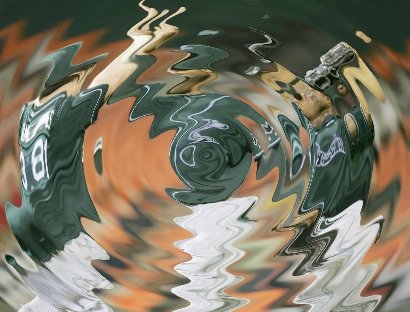 [June 30th] -- "There is nothing wrong with your computer. Do not attempt to adjust the picture; we are controlling transmission. If we wish to make it louder, we will bring up the volume. If we wish to make it softer, we will tune it to a whisper. We will control the horizontal; we will control the vertical. We can roll the image…make it flutter. We can change the focus to a soft blur, or sharpen it to crystal clarity. For the next few minutes, sit quietly and we will control all that you see and hear. We repeat; there is nothing wrong with your computer. You are about to participate in a great adventure. You are about to experience the awe and mystery which reaches from the inner mind to…the outer limits."
[June 30th] -- "There is nothing wrong with your computer. Do not attempt to adjust the picture; we are controlling transmission. If we wish to make it louder, we will bring up the volume. If we wish to make it softer, we will tune it to a whisper. We will control the horizontal; we will control the vertical. We can roll the image…make it flutter. We can change the focus to a soft blur, or sharpen it to crystal clarity. For the next few minutes, sit quietly and we will control all that you see and hear. We repeat; there is nothing wrong with your computer. You are about to participate in a great adventure. You are about to experience the awe and mystery which reaches from the inner mind to…the outer limits."
When I watched the "Outer Limits" as a kid growing up in Falls Church, I never once considered that the introduction of the program might be referring to Nationals general manager Jim Bowden. He controls all we see. Sometimes, things seem fairly clear, but mostly, the way the Nationals play is mostly a blur. It's almost as if as once we begin to get a clear fix on the team, Bowden turns his magic dial and things go haywire again. We all end up with headaches and then Bowden blames our televisions.
Jerk.
The Tampa Bay Devil Rays, since their inception a decade ago, have amassed the fewest number of wins in all of baseball. Were it not for the Devil Rays, the Nationals would be playing in the worst stadium in the league. And those uniforms! By far the worst in the league. Maybe ever (and that includes those gosh-awful White Sox "short-shorts" from the mid 1970's). So Tampa is the worst team in the league with the worst uniforms playing in the worst stadium.
And they're better than the Nationals.
Usually, a baseball team is saddened when less than 22,000 fans take in one of their games. But when a great majority of them are booing the home team, it's a downright positive situation. Such was Friday night at RFK. The Nationals got six hits, The Devil Rays had seventeen. Tampa scored nine times, Washington once. On the positive side, the Nationals did leave more runners on base than did the D-Rays.
The Nationals have reached a point that happens at some point to all bad teams. They stop trying, and they wait for "bad stuff" to happen. In their minds, they've lost the game before the first pitch is thrown. It's only a matter of time before some guy with no power hits a home run, or some pitcher who lobs the ball towards home strikes out ten. Then, when it happens, they say, "See? I knew it was going to happen."
When "real" teams give up, the manager gets fired. Sometimes, the general manager goes too. It will be very interesting to find out, when Mr. Kasten takes over, if this is indeed a real baseball team. Will Frank Robinson get axed? Will Jim Bowden become "former general manager Jim Bowden" once again?
Something big is going to happen. Soon. With the exception of the Kansas City Royals, every other team playing this poorly gets blown up, or restructured, or demoted, or something. A team just can't keep saying to it's fans, "Things will get better" when everyone knows it won't.
Yep. Big changes are in the offing. You can't be worse than the Tampa Bay Devil Rays and expect to remain intact.
COOLING OFF IN CANADA
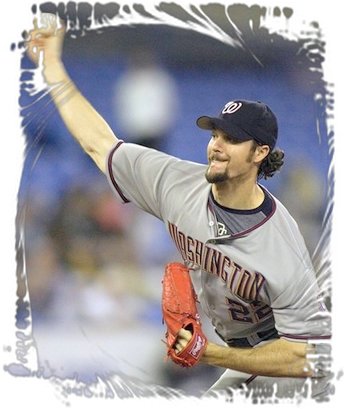 [June 29th] -- I love the Washington Nationals. Oh, I love my family more, but in term of hobbies, there is nothing that gives me more pleasure than watching Washington's baseball team play. Win or lose. But tonight ...
[June 29th] -- I love the Washington Nationals. Oh, I love my family more, but in term of hobbies, there is nothing that gives me more pleasure than watching Washington's baseball team play. Win or lose. But tonight ...
Let's be clear, none of this is the players' fault. Certainly, some of them aren't performing as they should, but that's because they've been asked to do things beyond their capabilities. We weren't angry when the Houston Astros stole all those bases against Matt LeCroy a month or so ago. Designated Hitters aren't supposed to have a canon for an arm. Tonight, it was Robert Fick's turn to fail in a position he shouldn't be playing. Fick, who came up as a catcher in the Tigers' organization, was moved to the outfield, then to first base, because of his shortcomings behind the plate. And yet, there he was, catching John Patterson at the Rogers Centre. Brian Schneider would have probably held on to that ball during the collision and saved a run. And Schneider wouldn't have forgotten what pitch he called and allowed that fastball to roll to the backstop. And the three stolen bases, well, Schneider would have at least had a chance to gun them down. Fick could have played almost anywhere on Thursday and helped the team; anywhere but catcher that is.
The Nationals keep losing in part because of players playing out of position. Daryle Ward, playing right field, ran to the wall and caught a ball a foot in front of the fence. Then dropped it. He also failed to cut-off a slow rolling ball that found the gap in right-center field. I could have cut that ball off, and I'm 5o years old. But that's no slight against Ward; he's a first baseman, he's a pinch hitter. He's not an outfielder. Over in left is Alfonso Soriano, who's not an outfielder either. It's not his fault when he fails to come up with routine fly balls. So, if it's not Robert Fick's fault, and it's not Matt LeCroy's fault, and it's not Daryle Ward's fault, and it's not Alfonso Soriano's fault, then who's to blame?
I don't have to actually write his name here, do I?
Now John Patterson is being affected by all this weirdness. He was pulled from the game because he had a "tired" arm? Manager Frank Robinson said he didn't look "quite right." Tired arm? Wasn't this like Patterson's 10th start of the year? How could his arm be "tired?" Maybe he just didn't "feel" like pitching because of all the crap that he's had to endure this year. And if that's the case, do we blame Patterson? No. We blame the "other guy." Without a healthy Patterson, or even a happy one, the Nats have no chance. Heck, they have less than no chance.
So, The Nationals have gone 4-14 after their 17-7 spurt. Three game sweeps are becoming the norm, and winning one game per series seems to be the team's "ceiling." But the guy whose fault all of this is will probably start carping about the team's effort in the press any time now. I have to assume that the silver lining in all of this is the fact that Stan Kasten and the Lerners won't be able to retain Jim Bowden under any circumstance.
I guess that's worth a few bad losses, right?
LOOK DEEP INTO THE LOSSES AND WHAT DO YOU SEE? LOSSES. NOTHING MORE.
 [June 29th] -- There is no need to write another story about Wednesday night's game. Just go back to Tuesday's entry and change the 6-0 score to 6-1, and change the part about Ryan Zimmerman being in a 1-25 funk to to his getting two hits. Other than that, it's the same old story.
[June 29th] -- There is no need to write another story about Wednesday night's game. Just go back to Tuesday's entry and change the 6-0 score to 6-1, and change the part about Ryan Zimmerman being in a 1-25 funk to to his getting two hits. Other than that, it's the same old story.DON'T SCREW THIS UP, JIM
 [June 28th] -- Washington Nationals' fans are ready for the veteran exodus to begin. That three week, 17-7 run not withstanding, it has been clear since the Alfonso Soriano trade last fall that this wasn't going to be a team that would, or could, contend. One day soon, we'll be greeted with a headline at reads something like "NATS TRADE SORIANO FOR XXXXXX. Now, XXXXXX will likely be the name of a player that few of us have ever heard of. And even if we know the name, we won't know for some time, perhaps years, if it was a good trade for the Nationals.
[June 28th] -- Washington Nationals' fans are ready for the veteran exodus to begin. That three week, 17-7 run not withstanding, it has been clear since the Alfonso Soriano trade last fall that this wasn't going to be a team that would, or could, contend. One day soon, we'll be greeted with a headline at reads something like "NATS TRADE SORIANO FOR XXXXXX. Now, XXXXXX will likely be the name of a player that few of us have ever heard of. And even if we know the name, we won't know for some time, perhaps years, if it was a good trade for the Nationals.
It wasn't too long ago that then Nationals' (Expos) general manager Omar Minaya made perhaps the worst "prospects for rent-a-veteran player" ever. Pretending he was in a pennant race, Minaya traded first baseman Lee Stevens, second baseman Brandon Phillips, pitcher Cliff Lee and outfielder Grady Sizemore to the Indians for Bartolo Colon. Minaya traded Colon to the White Sox seven months later for Orlando Hernandez, Jeff Leifer and Rocky Biddle; none of them had any real impact for the Expos/Nationals. Minaya also traded Jason Bay, listed by Baseball America as being one of the club's top prospects at the time, to the New York Mets for journeyman Lou Collier.
How would the Nationals look today had Minaya not made those trades? Take a look at this lineup, projected for the entire season:
1. Brandon Phillips [SS] ........308-16-90 ............33 steals, .354 OBP
2. Jose Vidro [2B]...............310-12-64 ............ .363 OBP
3. Grady Sizemore [CF]........300-33-85 .............375 OBP, 27 steals
4. Jason Bay [RF]................286-44-110 ............402 OBP, 15 steals
5. Alfonso Soriano [LF].........274-50-105 ...........40 steals
6. Nick Johnson [1B]...........308-25-75............. .438 OBP
7. Ryan Zimmerman [3B].......265-23-100
8. Brian Schneider [C]...........230-2-27
Add in Cliff Lee (on pace to go 16-11, 4.61 and Chris Young (16-7, 2.97), who was traded to the Rangers for Einar Diaz, and the Nationals would be a young, athletic, fast, powerful team with a rotation of Lee, Young, Mike O'Connor, John Patterson and Livan. The team would hit more than 200 home runs and steal more than 150 bases. They would easily be the second best team in the NL East, perhaps even better (the only caveat is that I'm playing Phillips at short, a position he first played in the minors. He's at second in Cincinnati).
The Nationals are going to win about 70 games in 2006, but they could have won 95. The difference? Poor "veteran for prospect" trades by Omar Minaya. If Jim Bowden goes the way of his predecessor, he'll bury the team for a decade. If he "chooses wisely," he could very possibly bring back to D.C. those very types of players that Minaya allowed to get away.
That said, who should go and who should stay? My take: 1] Players that must go: Alfonso Soriano, Livan Hernandez, Jose Vidro, Royce Clayton (he's worth a prospect if the Nats' act fast), Jose Guillen, Ramon Oritz, and Tony Armas Jr. 2] Players who might bring more than they are worth: Brian Schneider and Nick Johnson. 3] Guys who must stay: Ryan Zimmerman and John Patterson.
YUCK
 [June 28th] -- I don't want to complain about the Nationals' latest loss, a 6-0 drubbing at the hands of "Canada's team," the Toronto Blue Jays. Because the losses are becoming more regular, lashing out at the team's play, or desire, or even their uniforms, won't matter very much. You know the changes are coming, and they're probably coming soon.
[June 28th] -- I don't want to complain about the Nationals' latest loss, a 6-0 drubbing at the hands of "Canada's team," the Toronto Blue Jays. Because the losses are becoming more regular, lashing out at the team's play, or desire, or even their uniforms, won't matter very much. You know the changes are coming, and they're probably coming soon.My father, who would have celebrated his 89th birthday today, used to say to me, "you have to act while the iron is hot!" It must have made sense in the 1930's, because I never understood what he was trying to tell me growing up. But I understand now. When you need to make a choice, you do it at a time that's most advantageous to you, and not the other guy. Sigh. I wish my dad had talked to Jim Bowden. A month ago, Alfonso Soriano, Tony Armas Jr., Ramon Ortiz and a Livan Hernandez would have brought the Nationals a bevy of prospects in trades. They were all playing very well then. Today, Soriano continues to look confused at the plate. Armas is on the disabled list, and no one is exactly sure what to expect when Hernandez takes the mound. Ortiz isn't pitching poorly right now, but neither is he winning. I'm afraid that Bowden waited too long before unloading his veterans. Soriano and Armas couldn't remain that hot. Even though Livan was pitching poorly, no one would have thought that we were seeing the beginning of the "downside" of his career. Bowden said he would wait until another team "really needed" one of his players, before making a deal. By waiting, the Nationals have shown their hand to the other team's general managers. Instead of having all face cards, are deck is full of two's and three's.
6-0. NO runs. SIX hits. THREE errors. Zimmerman continues to slump. Will the Nationals be able to pull themselves out of this nosedive, or will it take a reshuffling of the team's deck? If they play another game like Tuesday's, we won't have to wait long to find out.
RIOS IS BECOMING A POWER HITTER SUPREME
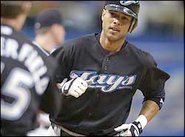 [June 27th] -- Keep an eye on the Blue Jays' Alex Rios during the Nats' series in Toronto. There was talk about a possible trade with Toronto last season involving Rios (I can't remember who was the Nationals' player involved), but the deal never materialized. Rios, 25 is 6'5" and 200 lbs, and the Blue Jays had always projected him as a slugger. When the Nats visited Toronto last season, about this time as I remember, he had one of the lowest slugging averages on the team and had exactly one home run. I figured that he was just another big guy who was never going to find his power. He began to hit with authority the second half of 2005, however, and ended the year with 10 homers in 481 atbats. He batted .262 with 10 home runs and a pretty lousy .307 on base percentage.
[June 27th] -- Keep an eye on the Blue Jays' Alex Rios during the Nats' series in Toronto. There was talk about a possible trade with Toronto last season involving Rios (I can't remember who was the Nationals' player involved), but the deal never materialized. Rios, 25 is 6'5" and 200 lbs, and the Blue Jays had always projected him as a slugger. When the Nats visited Toronto last season, about this time as I remember, he had one of the lowest slugging averages on the team and had exactly one home run. I figured that he was just another big guy who was never going to find his power. He began to hit with authority the second half of 2005, however, and ended the year with 10 homers in 481 atbats. He batted .262 with 10 home runs and a pretty lousy .307 on base percentage.Times have changed for Alex Rios.
Going into tonight's game against Washington, Rios is batting .323 with 15 homers and 51 RBI's. He's raised his OBP to .376 and he sports a .553 SLG average. He even has 9 stolen bases, all tremendous numbers for late June.
It's always a great story when a player all of a sudden "gets it" and turns into a star. It would have been an even better story if the Nationals had made that trade last season, regardless of who they would have had to give up.
MARRERO SIGNS, NATS HAPPY (ME TOO)
 that they have come to terms with Chris Marrero, their first first round draft pick in 2006, and will sign him when he visits RFK next week. After some batting practice with the "big boys," Marrero will report to the Nationals' Gulf Coast rookie team. In an interview earlier today, he said he'd probably play one of the corner outfield positions this summer. Scouts and "people in the know" are comparing him to Miguel Cabrera of the Marlins, and Carlos Lee of the Brewers. "If he fills out," says one scout, "he could be the next Pat Burrell." (is that good or bad?)
that they have come to terms with Chris Marrero, their first first round draft pick in 2006, and will sign him when he visits RFK next week. After some batting practice with the "big boys," Marrero will report to the Nationals' Gulf Coast rookie team. In an interview earlier today, he said he'd probably play one of the corner outfield positions this summer. Scouts and "people in the know" are comparing him to Miguel Cabrera of the Marlins, and Carlos Lee of the Brewers. "If he fills out," says one scout, "he could be the next Pat Burrell." (is that good or bad?)MIKE FLANAGAN REVISITED
 [June 27th] -- Yes, I used to watch the Baltimore Orioles, I admit it. Not to root for them, mind you, just for the joy of watching the only baseball available on D.C.'s local channels. No ESPN or MASN then, just WJZ-13 and the Orioles' Broadcasts.
[June 27th] -- Yes, I used to watch the Baltimore Orioles, I admit it. Not to root for them, mind you, just for the joy of watching the only baseball available on D.C.'s local channels. No ESPN or MASN then, just WJZ-13 and the Orioles' Broadcasts.Starting in 1976, I began to notice a new pitcher for Baltimore. He was a tall, thin lefty with a herky-jerky motion and bunch of curvy, off-speed stuff. He would look like a world beater for oh, five or six innings or so, then Wham! Bam! Whack! And that was that. Exit Mr. Flanagan. Slowly (it took about a season), Flanagan was able to make it past the 6th inning and eventually became one of the best pitchers of his era. He won 167 games over his career, and was selected to several all-star teams.
Fast forward thirty years. In 2006, I began to notice this tall, lanky left with a herky-jerky motion and a bunch of curvy, off-sped stuff. He would look like a world beater for oh, five or six innings or so, then Wham! Bam! Whack! And that was that. His name was Mike O'Connor. Thus far O'Connor has had only one bad outing, two weeks ago against the Colorado Rockies. I was watching the Rockies Fox SportsNet channel here in Idaho, and George Frazier correctly predicted that O'Connor would pitch well the first two times through the lineup, then begin to give up runs as the Rockies began to figure out his unusual motion. O'Connor has redeemed himself his last two starts, allowing just three earned runs in thirteen innings.
I think that the Mike O'Connor that we've watched this far is as bad as we'll ever see. With each game he pitches, he gets better, and learns how to stretch his limited ability even farther. Certainly, he doesn't have top-of-the-rotation stuff, but he could easily be the Nats' number three pitcher for years, winning 12-14 wins every season.
NATS AVOID SWEEP IN BALTIMORE
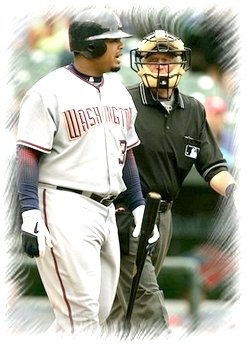 [June 24th] -- You know things aren't going very well when "Nationals Avoid Sweep" is a really positive headline. But after losing the first two games in Baltimore, they badly needed a win before shuffling off to Toronto. Thank goodness they got it.
[June 24th] -- You know things aren't going very well when "Nationals Avoid Sweep" is a really positive headline. But after losing the first two games in Baltimore, they badly needed a win before shuffling off to Toronto. Thank goodness they got it.
It didn't look very encouraging early on. Livan Hernandez, who's trade value seems to be dropping each time he takes the mound, allowed leadoff hitter Brian Roberts a single and then walked Bill Fahey. Miguel Tejada hit a double-play grounder, but Fahey took out Jose Vidro at second base, leaving runners on the corners with just one out. The Orioles should have gotten a run out of Javy Lopez's fly ball to right, but Marlon Anderson did his best "Jose Guillen" impression and threw Roberts out at home, ending the threat.
Do you remember the Nationals' exhibition game at Camden Yards earlier this year, just before the start of the regular season? The Orioles pitched Daniel Cabrera, whose 99 mph fastball, coupled with his devastating slider, made the Nationals look silly all game long. Not this time. He would throw a 98 mph fastball in the dirt, then try to compensate for his wildness by throwing 99 mph the next time. He threw one of those out-of-control heaters near Daryle Ward's head, then threw the next one even harder, hitting Ward on the upper shoulder, just inches away from the unprotected nape of his neck. Too close, and very scary.
Cabrera's "stuff" looks electric; I mean, how can a 99 mph fastball not be? His curve, his slider, all the off speed pitches, are top-notch. That said, he seems to get whacked around pretty good each time he takes the mound. One day, he may stop being a thrower and become a pitcher, but, it hasn't happened as of yet. But it might. When I was a tiny, tiny lad, I went to a game with my brother at The Los Angeles Coliseum, before Dodger Stadium was completed. I don't remember much, but I do recall this slender, stylish lefty who seemed to be able to throw his fastball through a brick wall. His curve was so good that when he threw it, my knees buckled. He lost the game something like 9-1. My brother told me that if he ever learned how to pitch, he'd become great. Sandy Koufax certainly did. Koufax "did it" by easing up a bit on the fastball and letting that rainbow curve become his out-pitch. To a lesser extent, Ramon Hernandez did the same thing this year, and won five games in a row. He's got all the tools to be dominant, but does he have the desire to change his style? Time will tell.
Ryan Zimmerman continues to concern me. He is 1-24 in his last four games, and looks both timid and tepid at the plate. He's down below .270 for the first time in quite a while, and you have to begin to wonder if he's just in a slump or has the league found a flaw in his approach? I don't know. A rookie season wouldn't be a rookie season without a few slumps, but Zimmerman is the "golden child," the team's Moses ready to lead them out of the wilderness and into the promise land. And, as we all know, Moses succeeded. Will Zimmerman?
Royce Clayton got three hits and is now batting .270. Regardless of what you think of him, no way would Cristian Guzman be hitting this well so late in June. Daryle Ward had two hits, two RBI's, and is hitting .322. Of the team's "long term" stars, Nick Johnson is the most replaceable, thanks in part to Ward. Ward and Matt LeCroy could easily take over at first for Johnson this year, and Larry Broadway could be ready next near. Marlon Anderson got two hits on Sunday, and Fick added a single. Marlon Byrd had his first good swing in a month, launching a ball deep over the left field wall. I guess the formula for success, at least for now, is to play all those guys that Jim Bowden signed that no one else wanted.
Jose Guillen's Plight: I love my wife, I mean, I really, really love my wife. I love her so much that you wouldn't think that we've been married 27 years. She is angelic and sweet and wonderful. Sometimes, though, when one of the kids are doing dumb things, or one of her college classes isn't going right, or when (God forbid) I've done something stupid, she gets a little, well, "testy" might be the right word to describe it. So when she's happy, everyone is happy. When she's "testy," .... well you get the idea. Remember now, her base personality is **perfect**. So what happens when you have someone like Jose Guillen, who's season thus far is a major league version of having a rough home life? Guillen is "testy" on his good days. When he is this year's Cristian Guzman, however, I can't imagine what it must be like to be around him. When he's hitting 25-30 homers a year, his teammates consider him "different;" When's he batting .217, he's a jerk. Bowden needs to trade the jerk ASAP before the pollutes the clubhouse any more than he already has. And if he doesn't, I'm going to have my wife rip him a new one. That'll show him.
What did you say sweetie? Okay, I'm off the computer right now. Of course, I'll take out the trash, and change Katie's diaper, and go get you a Dr. Pepper, and .....
THE NEWEST NATIONAL
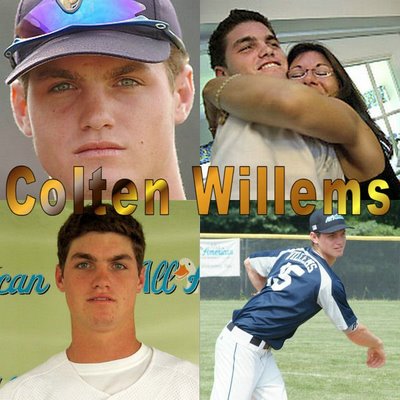 [June 24th] -- The Nationals announced that the team's second first round pick, pitcher Colten Willems, has signed with the club for a reported $1.4 million dollar bonus. He will immediately report to the team's extended Spring Training facility in Viera, just a stone's throw from his home in Fort Pierce. He had committed to the University of Florida, but told friends and family that he anticipated signing to play with the Nationals "if an agreement could be reached."
[June 24th] -- The Nationals announced that the team's second first round pick, pitcher Colten Willems, has signed with the club for a reported $1.4 million dollar bonus. He will immediately report to the team's extended Spring Training facility in Viera, just a stone's throw from his home in Fort Pierce. He had committed to the University of Florida, but told friends and family that he anticipated signing to play with the Nationals "if an agreement could be reached."First, kudos to Willems, who has shown that, like Ryan Zimmerman before him, money is important, but is certainly isn't everything. He probably could have squeezed a few more ducats out of Jim Bowden and Dana Brown, but he realized that being on the field, and not at the bank, would enhance his potential as a professional ballplayer.
Willems, only 17, was listed as the sixth best high school pitcher in this year's draft. Over the past two seasons at John Carroll High School in Fort Pierce, he amassed a 13-3 record with a 1.18 ERA. Unbelievably, he allowed only thirty-three hits in over 100 innings in his junior and senior year. He has a moving fastball that averages 92-93 mph but can touch 97 when needed. His "heater" was ranked third best among high school pitchers. The problem, however, with having such a devastating fastball in high school is that you don't need any other pitches, and as a result, his curve and other off speed pitches need a lot of work. His slider will in time be his #2 pitch, with his curve a distant third. Luckily, he has "pinpoint" control, so once those other pitchers catch up to his fastball, he will be able to dominate the opposition.
At this point, Willems is slated to be a #3 starter in the major leagues, and needs about four years to get there. So, with luck, he'll appear at the new park sometime in 2010. Now, all of this sounds wonderful, but remember, there are three guys at Class 'A' Potomac that came into the profession with similar press clippings, perhaps even better, and have struggled mightily thus far. Will Willems follow a fast path to Washington, or will he struggle like Colin Balestar, Mike Hinkley and Clint Everts?
Time will tell.
PATTERSON RETURNS, BUT WINNING WAYS DON'T
 [June 23rd] -- I'm getting a little tired of having to keep looking for the silver lining within each Nationals' loss. Luckily, there really was one on Friday Night.
[June 23rd] -- I'm getting a little tired of having to keep looking for the silver lining within each Nationals' loss. Luckily, there really was one on Friday Night.John Patterson, counted on to be the number-two starter for the team this year, went on the disabled list with exactly one win more than a month ago. After an unimpressive rehab stint at both Potomac and New Orleans, Patterson returned to the rotation with the admonition to stop the team's bleeding. Well, he didn't stop the bleeding, but he slowed it considerably. Patterson pitched six strong innings, allowing seven hits and no walks while striking out three. He lowered his ERA to 3.41. Patterson answered two questions on Friday. Yes, he's healthy, and yes, he can be the team's stopper if called upon. Considering the speed in which the Nationals are plummeting, and the ineffectiveness of the de facto stopper, Livan Hernandez, I'd say he'll be getting the "official title" any day now.
Other than that, another poor performance all around for the Nationals. Ryan Zimmerman, since cresting at .286 on Sunday, has seen his batting average drop fifteen points. Royce Clayton got three hits, as did Jose Vidro. That was about it.
I can't tell you why the Nationals have become a lethargic, heavy footed, head-to-the-ground team after the three week rapture that made us all feel so warm and fuzzy. Maybe this is the real team. Maybe the mix of veterans and rookies, at least in this case, just isn't working. Reports have placed GM Jim Bowden's right-hand man Bob Boone at a Yankees' Double-A game doing some serious scouting. Unless the veterans starting hitting and pitching soon, however, we won't have anyone the Yankees, or any other team for that matter, would want.
Hopefully, the Nationals will rebound tomorrow. We can hope, can't we?
WANTED: BLOGGERS!

[June 23rd] -- WANTED: Bloggers of all ages and sexes, from all financial, ethnic and religious backgrounds. Must live somewhere upon the Earth (or close to it). Must be able write at a first grade level. APPLICANT MUST BE A NATIONALS FAN! Apply at one of the existing Washington Nationals' blogs. There is no salary, but the fringe benefits are rewarding.
Sound silly?
The Washington Nationals are far behind the other major league teams in most areas. They have one of the worst minor league systems. Their current stadium is as old and rusty as is their manager. The team's major league roster is a complilation of has-been's and never-wases. Now, that's all true, but also true is the fact that we as fans cannot control, and certainly cannot correct, those problems. But we as fans are lacking in one particular area, and this is a situation that can be easily corrected.
If you do a Google-search for team blogs, the returns are overwhelming for the vast majority of the major league baseball teams. Even the Kansas City Royals have a bevy of blogs. What about the Nationals? More or less, I can find roughly twenty or so blogs that update on a regular basis, with another dozen (give or take) who update weekly, monthly, or "as the need arises." Sadly, several of those that now publish irregularly used to be some of the Nationals' finest daily blogs. Please don't get me wrong, I am not blaming the bloggers who have fallen by the wayside. Far from it; I am commiserating with them. I typically update 29 days a month, a pretty good record. It takes me an average of 20-25 hours per week to research and publish my blog. I can do it because, at least for another couple of semesters, I am a full-time college student who doesn't have to work. Most of my day is spent in front of my computer anyway. I'm not sure I would even have attempted to start this blog had I been a member of the workforce. I mean, the Nats are important, but then so is paying the mortage.
So, because of the strain and drain that the real world brings upon us, our numbers are dwindling (I so miss "Banks Of The Anacostia;" he was one of my first reads every day). This small cabal that I belong to has no power, and can effect no change, and is generally an afterthought to the team that we love. Jim Bowden, and now Stan Kasten and the Lerners, are making decisions based on their perception of what we want. They don't ask us, mind you. They just say, "Hey, I think the fans would like us to crank up the P.A. system between innings and play Tony Orlando and Dawn." And so they do. A few of us might scribble some negative comment about "yellow ribbons" and "strawberry patches" but that is where it stops. No tsunamic outrage ensues. It's just a line on a blog read by a couple of hundred people a day.
But what if, instead of having 25 blogs covering the Washington Nationals, there were 250? Or 500? What if, instead of one blogger grousing about Tony Orlando, there were hundreds who demanded something more contemporary, like, say, The Beach Boys? (sorry, my personal favorite). A strong, unified blogdom could, at least in a small way, drive the discussion. Would Kasten or Bowden listen? I don't know. But they would know that the hundreds of thousands of Nationals fans, fans who today have no real voice, would be represented by a group looking after their best interests. The Yankees and Red Sox and Dodgers have relationships with their bloggers. Others might as well. Do general managers think about what the bloggers might say before the pull the trigger on a potential trade? I don't think so. But the GM's would realize that the bloggers could be their team's best friends, or they could be their worst enemies. The choice would be the team's.
Case in point: Thirty years ago, a general manager was free to make any move without fear of the fans reacting, or even remembering. The only way, for instance, for a fan to find a particular general manager's trade history was to get ahold of the Sporting News' "Baseball Register," and even then, only that one fan had the information. When Jim Bowden traded Brad Wilkerson et. al. to the Texas Rangers for Alfonso Soriano, there was a blizzard of (mostly negative) stories written by Nationals' bloggers. I wrote at least a dozen myself, covering every conceivable angle. What did it mean for the team's payroll, or long term health. Would Soriano hit at RFK? Would Wilkerson hit more homers in Texas than Soriano would in D.C.? On and on it went. Within a week, Nationals' fans knew every facet, every nuance, every intricacy, of the deal.
Nothing gets by the ticket-buyers any longer.
So, it's time you started a blog. Become part of the Nationals' bird-dogs who ferret through the minutiae to insure that every fan, everywhere, is informed about the team's goings-on. We need at least 100 blogs online by the end of the season. Some might think that we bloggers would prefer having fewer competing with us. No. The more the blogs, the more there is to read. The more there is to read, the more readers there will be. The more readers there are, the more paying fans their will be at the gates at RFK.
Leave a comment with your email if you'd like to get some help getting started. I am a computer illiterate, yet through trial and error, I was able to create a pretty unique webpage. I can show you how. I can point you to dozens of websites that help make creating and managing your blog a piece of cake. Let me help. Ask the other bloggers; I'll bet many of them would be willing to help you too.
Why do I put in the 20+ hours per week? Because, outside of my family, it's the 20 most fulfilling hours I have. Each of us views the Nationals differently. Read twenty blogs and you'll read twenty different perspectives on the Nats. Start a blog and become the blog-o-sphere's 21st perspective.
ORIOLES - NATIONALS DEJA VU
 [June 22nd] -- Tomorrow night, June 23rd, the Washington Nationals will trot out onto the Baltimore Oriole's home field and begin a three game series with 32 wins to their credit. On that same day, exactly 37 years earlier, the Washington Senators trotted onto the Baltimore Oriole's home field and begin a three game series with 34 wins.
[June 22nd] -- Tomorrow night, June 23rd, the Washington Nationals will trot out onto the Baltimore Oriole's home field and begin a three game series with 32 wins to their credit. On that same day, exactly 37 years earlier, the Washington Senators trotted onto the Baltimore Oriole's home field and begin a three game series with 34 wins.Things haven't changed.
Well, yes, actually they have. The Orioles began that evening with a 51-19 record, by far the best in the major leagues. They enter tomorrow night's game with a 33-40 mark, only a game-and-a-half ahead of the Tampa Bay Devil Rays. Even more amazing, the Orioles, winners of the World Series just two seasons earlier, drew less than 8,000 fans to old Memorial Stadium that night. So much for any "Battle of the Beltway" during the Nixon administration.
All-star Dave McNally pitched for the Orioles that night. Casey Cox took the ball for the Senators. McNally was by far one of the top three pitchers in the American League that year, and Cox was just beginning his first full year with Washington. It was a scoreless game until the 4th, when Sudden Sam Bowen singled, plating Hank Allen (Dick Allen's brother) and Frank Howard. The Orioles tied the game in the 7th when Curt Motton hit a pinch-hit single, scoring Mark Belanger and Andy Etchebarren. The Birds blew the game open in the 8th when two current members of the Nationals staff, Frank Robinson and Davey Johnson, homered off of the best reliever in the league that year, lefty Darold Knowles. The Senators scored one final run in the 9th on a Ken McMullen single off of Jim Palmer, who entered the game in the 8th inning (Jim Palmer, a hall-of-famer, was still trying to return from an arm injury that side-lined him for most of the 1968 season). Ultimately, Orioles' closer Pete Richert came in and shut the door on Washington. Richert, who was traded by the Senators to Baltimore for Mike Epstein in 1967, wasn't particularly flashy, but certainly got the job done when Earl Weaver put the ball in his hands.
It'll be interesting to see if history repeats itself within the game itself. I think we'll be safe unless we see Jim Palmer jogging in from the bullpen.
NATS SCARED OFF BY BIG GREEN MONSTER

[June 22nd] -- It's time. Go ahead; give it a push.
For the third consecutive game, the Washington Nationals were throroughly outmatched by a team that didn't even seem to be trying. Over the three games, the Nats were bested by a rookie, by a pitcher so bad he was waived by the Kansas City Royals, and a veteran with a 60 mile-per-hour out pitch.
For the Nationals to win on a regular basis, every player has to play up to their potential, or better still, exceed it on a daily basis. For teams like the Boston Red Sox, they have to show up to the stadium on time.
That's the difference between the big boys and teams like the Washington Nationals. Now, don't get me wrong. I believe Stan Kasten's long-term plan is a sound one, and in five or six years, the Nationals, with a new stadium and a bevy of young bucks, will compete for the N.L. East crown for a decade or more. But what do we do in the meantime? How do we react as the team continues to get it's brains beat out by the big-boys? We can either say, "Oh well, they're terrible -- when does Redskins' summer camp begin?" or "Why isn't the team doing something, anything, about the situation?"
The Nationals were outscored in their three losses to the Red Sox by a 26-9 margin. Three starting pitchers sent to the mound, three starting pitchers completed less than eleven innings combined. Pitchers didn't pitch, hitters didn't hit, fielders didn't .... well, you get the idea.
So, a team that is without question going nowhere this year sends down a solid young infielder and returns Royce Clayton to short. Roy Corcoran (1-1, 1.93 at New Orleans) didn't get a call up this week but Jason Bergman, great last year but not this season, got the nod. It seems the Zephyrs' pitching coach thought Bergman deserved the callup more. Hmm.....
Over the forty-two years that I have spent on this Earth watching baseball, I have come to one unquestionable truth. Teams that plug the elderly into holes that surround young players never, never succeed. They seem to poison the youngster's enthusiasm and temperament. Why does Jim Bowden et. al. believe that a loss is somehow more palatable when Royce Clayton is at short? They aren't! But if at the end of the year, we can look past all those losses and say, "Hey, Brendan Harris batted .275 with some power during the second half of the year," doesn't that make those losses have some value?
I think it does. Instead of looking at those horrific line scores, we can check to see how the kids are doing, like we all do for Ryan Zimmerman after every game right now. It's either that or endure a long summer in Washington.
Hey, it's a thought.
OUCH!
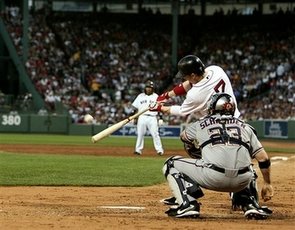 [June 20th] -- For the second straight night, the Boston Red Sox through a sub-standard pitcher against the Washington Nationals, and for the second straight night, Boston's so-so throwers outclassed their Nats' counterparts.
[June 20th] -- For the second straight night, the Boston Red Sox through a sub-standard pitcher against the Washington Nationals, and for the second straight night, Boston's so-so throwers outclassed their Nats' counterparts.Look, forget the loss; it'll end up being only one out of 90 or more that the Nationals will amass before the season is over. It's the timing of the loss that is causing me angst. Had Jim Bowden been willing to pull the trigger on some big trades two weeks ago, he would have received in return buckets full of prospects. Livan Hernandez, Tony Armas Jr. and Ramon Ortiz were all pitching at the top of their game. Jose Vidro was blistering the ball. Jose Guillen wasn't playing, but neither was he upsetting anyone. Alfonso Soriano was hitting a home run pretty much every evening. And Bowden could have told a prospective trade partner, "Look, Nick Johnson has been healthy all season -- that injury "bugaboo" is long gone!"
Now, two weeks later, Hernandez and Armas and Ortiz are getting the stuffing beat out of them each time they take the mound. Jose Vidro's line drives are a lot softer these days. Jose Guillen is hitting, but he's getting grumpy again. Alfonso Soriano is striking out a couple of times a game and Nick Johnson is hurt. How many prospects have the Nationals lost in potential trades by waiting to make deals until we get closer to the July 31st trading deadline? Many. Too many.
I think it's safe to say that those three weeks where the Nationals had the best record in baseball was a fluke, a once-in-a-season "give 'em all you've got" streak. Now, the team is looking suspiciously like that those Nats who started the season 13-27. That's not bad, and I'm not complaining. But the Nats are going to have a tough year with or without the aforementioned veterans. Why not get some deals done now before they play worse, or worse, they get injured and have no trade value at all.
The Nationals could finish the season with Schneider, Larry Broadway at first, Bernie Castro at second, Brendan Harris at short, Zimmerman, and a combination of Robert Fick, Ryan Church, Daryle Ward and Marlon Byrd in the outfield. A starting rotation of John Patterson, Mike O'Connor, Shawn Hill, Jon Rauch and (if healthy) Pedro Astacio (or another yet unamed rookie) could provide the team at least the opportunity to win a respectable number of games the rest of the way.
I'm not suggesting we field a minor league team for the remainder of the year, but if we're going to continue to get spanked this badly with the veterans, we might as well lose with the kids. It won't hurt as much.
What do you think?

HOW BOUT SUNDAY'S GAME! (AND FORGET MONDAY'S)
Oh well, some games will be like this one. The guys deserved a bad one after the last two games against the Yankees. But boy, they'd better win tonight.
HISTORIC!
 [June 18th] -- The outcome of Sunday's game against the New York Yankees underscores and emphasizes why I have been using my blog to beg the Nationals to trade their veteran players for kids. It's not about payroll, it's about intensity.
[June 18th] -- The outcome of Sunday's game against the New York Yankees underscores and emphasizes why I have been using my blog to beg the Nationals to trade their veteran players for kids. It's not about payroll, it's about intensity.
Had that long, game-winning home run been hit by a multi-millionaire, he would have stood at the plate and admired his blast, then jogged around the bases slowly before touching the plate with his big tow. "Been there, done that" would be body language of the veteran.
Not Zimmerman.
the Nats' 21 year old rookie swung at Chien-Ming Wang's first pitch, a fastball over the plate but a tad outside, and drove it high and deep towards those bush-league banners in left center field. He knew it was gone the minute he hit it, but started running towards towards first without stopping to appreciate his blast. He pumped his fist in the air as he rounded first, flipped his helmet after passing third, and leaped high into the air as he reached home plate, falling gently into his fellow teammates waiting arms. Nats win! Nats win! Zimmerman, 300 at bats into his major league career, is now an all-around star for the Nationals. I've got to be honest, a month into the season, I was beginning to worry about him, that he might actually have to spend some time in New Orleans this summer. He kept striking out on outside breaking balls, and his batting average, hovering near .245 for most of the young season, had dipped to a low of .229. Since then, however, he has been the Nats most consistent hitter. Not the best, to be sure; he hasn't had any of those "hot streaks" that Alfonso Soriano, Jose Vidro and Nick Johnson have had.
That said, neither has he had any of their "cold streaks" that are difficult to watch. At this rate, he'll hit near .290, whack close to 25 home runs, and drive in far more than 100 RBI's for 2006 despite batting in the number six hole in the lineup for the first part of the season.
number six hole in the lineup for the first part of the season.
And now's he a hero too.
Mike O'Connor, who would never have had the opportunity to pitch in Washington if Brian Lawrence and Pedro Astascio not been injured, is another reason that a youth movment won't be as painful as some may think. This was an important game for the rookie. After throwing his first bad game of the year in his last start against the Rockies, he needed to prove that his first eight starts were the rule, and his last start the exception. No sweat -- the kid came through. In seven innings, O'Connor baffled super-stars and future hall-of-famers with his 85 mph fastball and that looping, drooping curve ball. He struck out five and walked three, allowing just four hits. He allowed one "earned" run to lower his ERA to 3.43, but I don't see how that run was earned. Rodriguez doubled and reached third on a wild pitch, then scored on a sacrifice fly to right fielder Jose Guillen. If O'Connor doesn't throw that wild pitch, Rodriguez never scores -- that fly ball to Guillen waould have been nothing more than the second out of the inning. In fact, I don't see how it was even a "wild pitch," as the ball was no more than a foot outside. More likely, Fick was expecting an off speed pitch and couldn't catch the fastball that bounced off his glove. I hope the official scorer takes another look changes the call to "unearned."
I was stunned to see Yankees' manager Joe Torre send back out Chien-Ming Wang to pitch the 9th inning. I have to assume that he didn't trust his "bad" bullpen pitchers, and his "good" ones were too tired to get into the game. And it's a shame, too. Wang has shown he is a solid major league pitcher, and shouldn't have been put into that position -- either he win's or he gets a "no decision." I'm sure that those warm-and-fuzzy Big Apple journalists are going to give Torre a "pass" for his decision. Right?
And for you anti-youth movement readers (and most of you seem to be just that), may I point out that the Florida Marlins, who couldn't beat a drum earlier this season, have now won eight games in a row and are only a half-game back of the Nationals for third place. Even weirder (more weird?), the Atlanta Braves are in last place.
Go figure.
COMEBACK KIDS CRANK YANKS
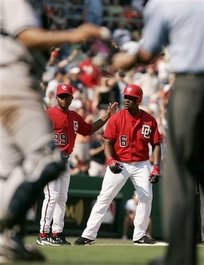
[June 17th] -- The moment of Johnny Damon's grand-slam home run, that made the score 9-2, would have been the perfect time to walk away from my computer and spend the day with my family. They went to the swimming pool, but I stayed behind because I had to prepare for yet another Geology test. So when Damon's blast made the game "unwinnable," I turned down the XM radio but continued to keep an eye on the MLB gameday as I continued my study of plate tectonics. What I should have been doing was watching the events at RFK's plate. Slowly, the Nationals pecked away at the Yankees lead. A run here, a run there, and by the seventh inning, they were actually in position to make a run at the Yankees. But that wasn't possible, right? I mean this is the New York Yankees we're talking about, and they brought in Mariano Rivera in the 8th inning to make sure the game got no closer. You know, Mariano Rivera, the guy who hadn't given up a run in a month -- that guy.
It didn't matter.
Whether rookie or future hall of famer, the Nats kept pounding away, using a lot of talent and a little bit of luck to put the pain of the five game winning streak behind them. What kind of luck? Well, how about Alfonso Soriano running towards third base in an attempt to steal his second base of the inning. One problem, though. Derek Jeter had snuck in behind Soriano and was ready to pick him off the base. And Rivera saw it. Luckily, he saw it after he went into his windup, making the pickoff moot. Whew!
Just as the just completed losing streak didn't make the team worse than they really are, neither did this win against the Yankees make the Nats any better. They won this one game, and they did it in a very special way, but they are still eight games under .500.
When I was thirteen, The Washington Senators had the first pick of the 1969 amateur draft, and with that pick, chose outfielder Jeff Burroughs from Long Beach, California. I remember a photo of him in a pinstriped uniform that graced the front page of the Washington Post's sports section. Burroughs was a "can't miss" prospect, a guy who was going to be the next Frank Howard, someone who would help take the Senators to a new level. And he did to an extent, though it was after the team moved to Texas. Back then, it was difficult to follow the minor leagues. About all that was available was the weekly Sporting News, which offered a single column for each league's highlights for that week. Limited information came from Wytheville, Pittsfield and finally Denver, but it was clear that Burroughs was going to be a good one. Ryan Zimmerman is this generation's Jeff Burroughs. A high draft pick with a "can't miss" future, one of the first things that Nats' fans check after the score of the game is how well Zimmerman played. So far, he's everything that Jim Bowden promised. He looked very "rookie-like" early in the season, but it seems that he has corrected each problem he has faced. After a two or three weeks of outside breaking balls resulted in 20 or so strikeouts, he made a correction, and now those pitches that were resulting in strikeouts are now being driven the opposite way towards right field. His batting average continues to climb as well. It seemed that .250 was a barrier he could not break, but once he finally began hitting that outside breaking ball, his average jumped, gaining more than thirty points in less than three weeks. He hasn't hit a home run in awhile, but he keeps hitting doubles and driving in runs. He's on pace to hit 44 doubles, 23 homers and drive in more than 100 runs. Not bad for a rookie who a year ago was wearing the orange and blue of the University of Virginia.
GHOST OF JOHN WETTELAND SINKS NATS IN 9TH
 [June 17th] -- Gary Majewski admitted that former bullpen coach John Wetteland's antics might have caused he and closer Chad Cordero to perhaps not follow the game as closely as they should have. That's what he said. What he probably meant was that they didn't let the game get in the way of their antics. If that's the case, then Wetteland, fired on Thursday following the team's loss to the Rockies, must have been lighting fire crackers in abstensia on Friday. Majewski allowed three hits and two runs in just 1.1 innings, allowing the Yankees to come back from a 5-3 deficit to tie the game in the 8th inning. Chad Cordero pitched the 9th with the game still tied, and allowed two runs to send the Nats to defeat.
[June 17th] -- Gary Majewski admitted that former bullpen coach John Wetteland's antics might have caused he and closer Chad Cordero to perhaps not follow the game as closely as they should have. That's what he said. What he probably meant was that they didn't let the game get in the way of their antics. If that's the case, then Wetteland, fired on Thursday following the team's loss to the Rockies, must have been lighting fire crackers in abstensia on Friday. Majewski allowed three hits and two runs in just 1.1 innings, allowing the Yankees to come back from a 5-3 deficit to tie the game in the 8th inning. Chad Cordero pitched the 9th with the game still tied, and allowed two runs to send the Nats to defeat.
When I first heard of the firing of John Wetteland, I certainly didn't think that a bullpen coach could have possibly been responsible for the reliever's poor performances this year. The more I hear, however, the more I am beginning to understand. The bullpen became a cabal of capriciousness, with more time and attention given to firecrackers and wise cracks than the status of the game. Instead of discussing the various scenarios that the pitchers might face during the game, they played childish high-school pranks. He is being replaced by Randy Knorr, currently the manager of the second-place Potomac Nationals. He is a no-nonsense guy, and I hope that we'll begin to see some changes right away. It
It would seem that the Nats' "magic" is gone. After sporting the best record in baseball for three weeks, the Nationals have now lost five in a row, and face in the coming days and weeks the very best of the American League East. Unless something significant happens, the Nats might find themselves with a similar record in two weeks to the one they had a month ago.
On the positive side, Alfonso Soriano broke out of his week-long homer-less slump with a bomb off of Jaret Wright. Was tonight the beginning of a three-day audition for Soriano, and did his home run enhance his chances of rejoining the Yankees? Many Yankees' blogs have openly been rooting for a trade between the Nats and Yanks. Soriano has made it clear, however, that he is going to be a second baseman in 2007, which means the Yankees would have to at least consider moving Robinson Cano next season to placate Soriano, assuming he could be resigned. I get the feeling that Fonzie would be willing to take a smaller payday to ensure that he returns to second base next year. Cano is certainly a decent enough second baseman, but not good enough to keep Soriano from playing there. Ryan Zimmerman got two more hits and an RBI and is now batting .281. Until recently, the only part of Zimmerman's rookie season that was less than stellar was his batting average. No more. More and more, Zimmerman is going the other way, dumping singles over the second baseman's head as well as driving doubles down the right field line. He looks drive the ball on with one strike, but when he gets down in the count 0-2 or 1-2, he tries to go the other way. Zimmerman is proving with every game that he is going to forsake "slugger" status for that of a "professional hitter." He is just as apt to go the opposite way or bunt down the third base line as he is to bounce a fastball off the back wall of RFK. Once he cuts down on his strikeouts, he will be as good as, probably better, than the Braves' Chipper Jones. While his offense will be remarkably similar, his defense will be far better than Chipper's ever was(remember, Jones has been barely adequate at 3rd during his career).
While watching the game, it seemed that rookie Shawn Hill was getting the begeebers beat out of him by the Yankees. There were always runners on base, and he seemed to be giving up runs every inning he pitched. In the end, however, Hill gave up only three runs and eight hits in six inning -- not exactly an embarrassing outing. His ERA is still stellar at 2.42. Overall, considering it was the Yankees he was facing, and in front of 44,000 fans, I'd say he pitched remarkably well.
Remember how badly Frank Robinson felt, how many tears he shed, when he was forced to pull Matt LeCroy in the middle of an inning? Well, apparently he feels comfortable embarrassing Marlon Byrd. With the bases loaded and one out, Robinson yanked Byrd and pinch hit Daryle Ward (who hit a sacrifice fly to score a run). How come pinch-hitting for a player early in the game is okay, but pulling a catcher in mid-inning isn't? I mean, it wasn't like it was the 8th inning -- it was only the 3rd inning.
Royce Clayton was injured diving for a Melkey Cabrera ground ball. Although there has been no word about the extent of his injury, Clayton looked to be in a great deal of pain in the dugout. Brendan Harris will be given the opportunity to replace Clayton if his injuries keep him out of the lineup for a prolonged period. Actually, though I wish no ill towards Clayton, the Nationals need to find out if Harris can play short on an everyday basis. His best positon is 3rd, but that's not going to happen, and he can play second very well too. If he can handle sort, he may become the team's long term answer there.
The Nats send Ramon Ortiz to the mound on Saturday to face Shawn Chacon (4-1, 5.33).
THE GOOD WITHIN THE BAD
 [June 15th] -- Talk about a dose of reality.
[June 15th] -- Talk about a dose of reality.
After crafting the best record in Major League Baseball over the last three weeks, the Nationals have again become Washington's "lovable losers." The boys lost four in a row to the Colorado Rockies, a team that was sub .500 before this series started. The Nats didn't just "lose" to the Rockies, they were discombobulated, having been outscored 35-14 over the series. Billy Bray and Mike O'Connor can no longer boast of near-perfect statistics. Errors and strikeouts with runners on base, both of which vanished during the winning streak, have returned with a vengeance. Gary Majewksi and Jon Rauch have once again begun giving up runs in embarrassing numbers. Alfonso Soriano is no longer Superman. What if the past three weeks was "the run" for 2006, and that they're now back to playing Keystone Cops type of baseball?
Actually, I think it's a good thing.
It would have been unfortunate if the Nationals had chosen to keep the team intact for some near-impossible playoff run, with the end result being that players like Jose Guillen and Alfonso Soriano would have left the team through free agency with the Nats receiving only draft picks in return. Perhaps Stan Kasten will now be even more emboldened to make the moves necessary to stock the minor leagues and prepare for that strong future that we keep hearing about. I don't want Nick and Brian and Jose And Livan to be traded, but if those four, plus Soriano and Guillen, can end up adding ten or twelve potential major league players to the minor league roster, well, so be it.
A prolonged winning streak and a climb in the standings won't make Stan Kasten reconsider his "success begins in the minor leagues" policy. Far from it, more wins means that those tradeable stars will have more value and bring even more future stars to the Nationals' minor league system. I fear, however, a backlash from the Nationals' rank and file fan base if many of the team's star players begin to be traded in mid July with the Nats at or near .500. To some, it will look like a cost-cutting measure, when in fact those moves will be a solid investment in the team's future.
What might such a move look like? We only have to go back to last fall and see how the Florida Marlins were destructed, then reinvented. Players like Josh Beckett and Mike Lowell and Juan Pierre were moved out of town in favor of a combination of reduced payroll and an increased prospect base. And some of those prospects are bearing fruit already. Mike Jacobs, a soon-to-be super-slugger, is on pace to hit .260-23-82; he is a first baseman in the mold of Ryan Zimmerman. Dan Uggla has had a strong June and will hit somewhere near .308-26-84 and Hanley Ramirez is hitting .283 and will steal more than 45 bases. And that's just the beginning.
There is no question that the Nationals will get much worse before they get better. But honestly, what's the difference between a 73 win season and and a 64 win season (besides the nine wins of course)? 73 is roughly the number of wins the Nats will likely win this year. 64 is the number of wins the Nats will win if those five or six tradeable players are moved.
I'd say those nine wins are a small investment for a solid future. We'll see.
NATS NOTES: Ryan Zimmerman continues to show that he is one of the National League's best rookies this season. As the Nationals approach the mid-point of the 2006 season, he is on pace to hit the following: AB:622 ~ R:85 ~ H:172 ~ 2B:45 ~ 3B:3 ~ HR:23 ~ RBI: 103 ~ W:60 ~ K:155 ~ SB:10 ~ BA:.277. Youngsters like Zimmerman, if they are going to be real power hitters, tend to have many more doubles than is typical early in their careers, indicating that they aren't quite mature enough to hit home runs on a regular basis. He's on pace to hit 23 homers and will hit 10-15 more doubles than a typical power hitter. Add the 23 homers to the 10 extra doubles, and I'm thinking he's going to be a 35 homer-a-year guy. His strikeouts are still high, but he was on pace to strike out more than 170 times 25 games into the season, and heading for 160 k's at the 50 game mark. As he continues to learn the major league strike zone, his strikeouts will continue to decline. With a solid second half, he might end the season with 120-130 k's ...... It's a good thing that Mike O'Connor and Billy Bray got whacked around on Wednesday. With each passing day, the pressure to not pitch a bad game, or a bad inning, becomes almost insurmountable. Now that it's happened, both of them can go back to pitching and not worrying about failing, because they already have. I'll bet you a pack of Hostess Donettes that O'Connor pitches a gem his next time out; Bray too. .... With John Patterson almost ready to return to the Nationals, Shawn Hill's next start, against the Yankees, might also be his last (at least for the time being). The question is, will Hill go to the bullpen and be kept on the 25 man roster, or will he be returned to New Orleans so that he can remain sharp? ..... Will Jon Rauch ever be given the opportunity to be a starter for the Nationals? Unless the Nats trade both Livan and Ramon Hernandez (and Tony Armas Jr. for that matter -- one year contract, remember?), he's going to have little chance to show his stuff. If he does become a starter, then the Carl Everett for Rauch and Gary Majewski trade will go into the "steal" column. If he remains a reliever, then it will go down as simply a "good" trade. Everett hit .251-23-87 for the White Sox last year, and is on pace for a .243-20-63 campaign with a .320 OBP and a .333 SLG percentage, about what you'd expect from a 36 year old with no wheels.
DAY OFF
BOMB
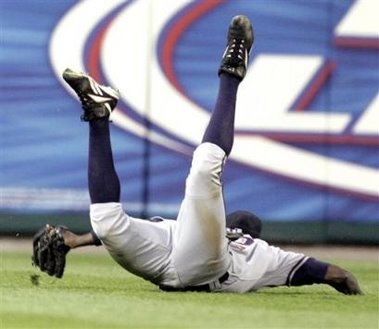 [June 14th] -- The game? Well, the game looked a lot like this picture -- as in "The Nats fell flat on their face tonight."
[June 14th] -- The game? Well, the game looked a lot like this picture -- as in "The Nats fell flat on their face tonight."
Yet another Geology test precludes me from spending the appropriate amount of time dissecting the Nationals loss to the Rockies, but there are a few things that need to be considered. To wit:
It's been nice having Jose Guillen back in the starting lineup, though he did go 0-3 against Josh Fogg last night. He'll hit; that's not a concern. What is a concern, however, is his defense. Twice, he ran (or tried to run) towards the gap to snare a drive, and twice, he showed up too late, limping on his gimpy hamstring. A healthy Guillen makes both of those catches easily, and who knows if those two outs would have made any difference in the outcome of the game. Hamstring injuries are problematic; they can take weeks to mend, and running around the expansive RFK outfield is going to add additional time to his "get well" calendar. It's sad that, in his contract year, Guillen just can't get healthy and earn some real baseball dollars. He's not, after all, going to be signed by another team for his personality.
The boys on the Rockies broadcast kept mentioning what a good second baseman Jose Vidro "was." Was? Sadly, they are probably right. Just a few weeks ago, the 31 year old was able to sprint hither and yon with little trouble. Any limp was hardly noticable and only in the late innings of the occasional game. Now, the limp is common, and his home-to-first speed is Frank Howard-esque. His defensive range is so poor that he makes the routine play look exceptional. Brendan Harris, no great glove-man, looks like a stud at second compared to Vidro. It's really a shame. His bat can still hit .330, but his knees will probably suck 50 points or so off that average before the season is done. Of all the Nats, he is the one I want the most "good things" for. He stuck with the team during the very worst, and now, when those "good things" could finally be bestowed upon him, his age and injuries have robbed him of his "special" qualities.
Mike O'Connor got whacked hard for the first time this season. What's strange is that for his first five or so innings, he was unhittable. Strike after strike after strike dribbled, drabbled and dropped over the plate. I was watching the game on our local (Idaho local) Rocky Mountain SportsNet channel, and Rockies' announcer George Frazier made an interesting observation about O'Connor. "O'Connor is having a great rookie year, but there is a key to his success; it comes in the first five innings or so. He gets the batters out the first and second time through the lineup, but by the time the batters face him for the third time, they figure him out. If he holds true to form, he'll blank the Rockies until the 5th or 6th inning, when they should break through for some runs."
Wow. Clairvoyant.
He was right, of course, and this observation might become the Achilles heel of young Mr. O'Connor. He's averaging only 5.3 innings per outing, not because he begins to tire, but rather because the opposition starts to make sense of his "junk." If this is true, that O'Connor can only be counted on for five or six innings, might he be of better use in the bullpen and not in the starting rotation?
We'll see. For now, Tuesday's loss was but one loss in a 162 game season. Hopefully, he'll go eight innings or so his next time out and put all of this to rest.
IS THIS SMILE ..... WORTHWHILE?
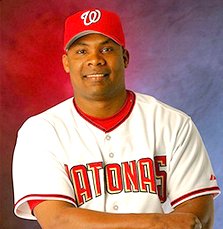 [June 13th] -- Yeah, yeah ... I know. The Nats lost. I was able to watch the game on my local Fox SportsNet channel -- the Rockies are our "local" team here in Idaho, though Major League Baseball seems to be clueless to the fact that Idaho considers itself part of the Pacific Northwest and Not the Intermountain West. Hmmm.... isn't there an MLB team in Seattle? Well, kinda.
[June 13th] -- Yeah, yeah ... I know. The Nats lost. I was able to watch the game on my local Fox SportsNet channel -- the Rockies are our "local" team here in Idaho, though Major League Baseball seems to be clueless to the fact that Idaho considers itself part of the Pacific Northwest and Not the Intermountain West. Hmmm.... isn't there an MLB team in Seattle? Well, kinda.
As I said, the Nationals lost to the Colorado Rockies, 4-3. But there are losses, and then their are losses. Tonight's game was more like a game we didn't win. Ramon Ortiz continues to pitch well, though he took the loss and broke his personal five game winning streak. Yeah, he did give up four runs in six innings, but he gave up seven hits, a tolerable number for his innings pitched. He continues to dominate at times, striking out another seven batters. If that was his worst outing in a month, I'd say he'll be just fine.
I try to refrain from whacking on Frank Robinson, but what was he thinking last night? Although it obvious to everyone that Ortiz didn't have his "good stuff," he nonetheless kept the Rockies at bay for most of the night, before slowing down those last couple of innings. But instead of replacing him in the 7th inning, he allowed him to take the mound, and, well, bad stuff happened. He must have been at or near 100 pitches by then. Why did he leave him in? That was bad, but even worse, Robinson left Matt LeCroy, a certifiable long-ball threat against lefties, on the bench in the 9th inning and instead chose to bat Damian Jackson, all 150 pounds of him, as the pinch hitter with the team down only one run. Why?
What's happened to Alfonso Soriano? Suddenly he's shed his Superman togs for something more akin to the Boy Wonder. Some would say that it's just a slump, that he certainly is deserving of a "bad spell," and that he'll be back. And they'd be right, too. But then again, maybe it's more than that. Isn't it just as likely, perhaps more so, that after 65 games of overacheiving, Soriano is starting to come back to the pack, and will end the season with numbers more typical of his career average (around .280-30-100)? Although I hope that isn't the case, I think it is. A veteran player doesn't get traded from one of the smallest ballparks in the league to one of the biggest and increase his power production. No, I think we're seeing the beginning of a natural slowdown, a evening-out process that is probably far overdue. Do you remember Brad Wilkerson's start last season? Thirty or so games into the season, he was on his way to obliterating virtually every career high. Then something happened. He stopped hitting for the cycle. He kept striking out. By the end of the year, he put up numbers not atypical for his career. Maybe Soriano is pulling a Wilkerson. And if that's the case, it's time to trade him now, before he begins to lose his uber-value.
Okay, so what do we do with Jose Guillen? He's been back only two games and has made a big difference in both. He got another two hits against the Rockies, got two more RBI's, and made the game interesting with an opposite field home run in the bottom of the 9th. The Nationals are much better team with Guillen healthy and in right field. Too bad he'll be gone shortly, that is, if you believe Bill Ladson. In his last mailbag, Ladson virtually guaranteed that Guillen's days in Washington are numbered. Ah, poor Mr. Guillen. He demanded a five year, $50 million dollar contract this spring, and the team countered with a more reasonable offer. He turned it down. Now, after a slow start, he's not wanted in D.C., and probably won't bring more than a mid-level prospect, someone not likely to make a real difference at the major league level. Even Guillen is now admitting that he might have made a mistake in not taking the offer, but "oh well." Now it looks like he'll be gone sometime soon, playing for yet another team in another city with no hope of earning any kind of competitive multi-year deal.
Oh well.
NATS CONTINUE STANDINGS CLIMB WITH 6-0 DRUBBING OF PHILS
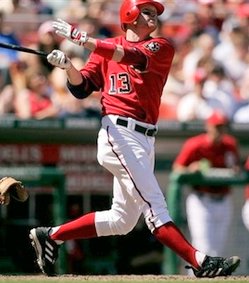 [June 12th] -- The "boys" are having fun. Finally.
[June 12th] -- The "boys" are having fun. Finally.
Usually, it's difficult to point to the reason that a team can amass one of the worst records in baseball for six weeks or so, then suddenly and from out of nowhere become the team with the best record over the next three or four weeks.
The Nationals, however are a different story, When the Nats were playing just a wee bit better than the Kansas City Royals, their pitching staff was one of the very worst in baseball. It seemed that every starting pitcher was giving up five, six, even seven runs every night. I didn't matter if Frank Robinson trotted out Livan Hernandez or Ryan Drese, bad things were going to happen. Now, Livan, Ramon Ortiz and Tony Armas Jr. are pitching their best baseball of the year, and two kids, Mike O'Connor and Shawn Hill, have stopped the bleeding in the back of the rotation with a slew of solid outings. Between the two of them, they have started twelve games for the Nationals, and neither of them has yet to give up more than three earned runs in a game. That will keep you in a lot of ballgames over the course of a long season.
On Sunday, Hill was brilliant, allowing only two hits and no runs, lowering his ERA to 1.80. In twenty innings, Hill as given up a total of nine hits. NINE HITS! Neither of the rookies are "kids;" both are 25, which gives them veteran-like mound presence along with their outstanding stuff. According to the baseball calendar, they "just made it." You're a prospect at 25, but washed up at 26. Good for them. Their solid starts have given Jim Bowden a lot of leeway in how he constructs the roster for the second half. Bowden could trade both Livan and Ramon Ortiz for prospects, and still have a solid rotation of John Patterson, Tony Armas Jr., O'Connor and Hill, and still have a Pedro Astacio to plug into that 5th slot.
Billy Bray also may present a problem for the Nats one day soon. He has closer stuff, but doesn't have enough pitches to be a starter. In fact, he's never started a game in college or the professional level. If Bray continues to impress, someone might get traded, unless the team can afford to be in a situation where they are so good that they can afford a "closer" be their setup man. We'll see.
It was nice to see Robert Fick and Daryle Ward hit homers in the 8th inning. I've always been a fan of Fick; he plays baseball "old school." He can catch, play first base and the two corner outfield positions. Playing a full season, he's hit around .280-12-70 a couple of times, so the Nationals need to keep him around. Ward too.
That's it for now, off to another Geology test. These four week summer classes are nice because they are over soon, but, man, it's like a test every three or four days! I'll write more later.
PHANTASTIC!
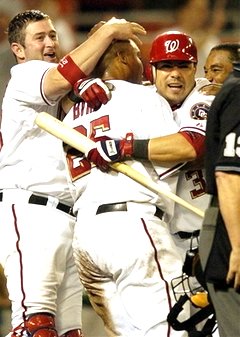 [June 10th] -- I was reading one of the many Phillies' blogs this morning, and came across one that excoriated Brett Meyers for his effort last night, angry because the Phillies' ace gave up more than three runs for the first time in almost a year.
[June 10th] -- I was reading one of the many Phillies' blogs this morning, and came across one that excoriated Brett Meyers for his effort last night, angry because the Phillies' ace gave up more than three runs for the first time in almost a year.
Gee, just a month ago, Nationals' fans would have accepted Meyers' effort as a "solid outing." My, how times have changed.
The Nats continued their climb back to respectability with a 9-8 extra inning, rain soaked win against the Phillies, who have now lost two in a row after sweeping the first place Diamondbacks earlier in the week. The Nationals have the best record in the bigs since May 18th (17-5) and are now tied with the Atlanta Braves for 3rd place in the National League East.
The Nationals' turnaround comes as a big surprise to me, considering their premier slugger from last season, Jose Guillen, and their top pitcher, John Patterson (sorry Livan), have not been part of the surge. No, instead, the Nats have played championship ball with three infielders, Alfonso Soriano, Damian Jackson and Marlon Anderson chasing balls down in the outfield. Is their recent success a "leveling out" of the bad luck the team withstood during the first two months of the season, or have they suddenly figured out how to play baseball again? The answer is simple, of course. The Nationals weren't as bad as they played in April and May, but neither are they as good as they are playing now. Even the very best major leaguer hitters can go hitless over five or six games; so too can a team lose for a couple of months before suddenly going on a long winning streak.
Don't get me wrong; I'm downright giddy at what the Nationals have done the past few weeks. But it had to happen. The Nationals were certainly not as bad as their play earlier in the year, and luck, chance, random outcome -- whatever you want to call it -- finally came to their rescue and evened things out a bit.
So where do they go from here? They are now only four games under .500 and on pace to win 76 games. Most of us bloggers pegged the Nats win total for 2006 somewhere between 74 and 81 wins. It looks like we were right on target. Thus far, among the team's roster, no one is playing particularly worse then I had imagined, and several players, Soriano, Ryan Zimmerman, Mike O'Connor, Royce Clayton, are playing better (though Patterson and Guillen have been injured). Perhaps then, the Nats might end up at .500, perhaps a game or two over.
This winning streak, and the increased attendance that it will surely bring, will make it difficult for the Nationals' owners to "bite the bullet" and trade veterans for prospects. The way the team is constituted, the Nationals could be "good enough" for some time to come, but never great, never in real contention for a playoff position, not if the team won't be persuing free agents as Stan Kasten has said.
It'll be interesting to see if the new owners will be willing to break up a surging team to build for the future. It'll be a tough decision, regardless.
NATS NOTES: Bill Ladson sounded concerned that Jose Guillen has rejoined the Nationals clubhouse. Ladson noted that this amazing run began when Guillen's injuries forced his transfer to the disabled list and away from Washington. Interesting. Remember, the Nationals splendid first half run in 2005 came during Guillen's "honeymoon" in Washington, when both he and his teammates were on their best behavior. Once he began to explode, so did the Nationals' chances at winning the NL East. If the team suddenly beging to lose again, Guillen might find himself traded very quickly.
NO MATTER WHAT HE'S WEARING, HE ALWAYS LOOKS GOOD
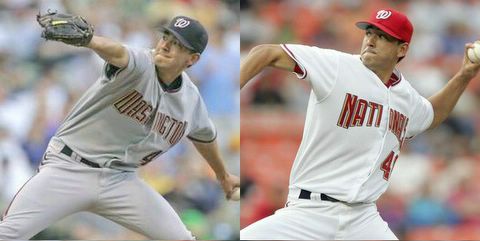 [June 9th] -- I guess you don't need huge stars to turn around a team after all. Mike O'Connor, a name I hardly knew coming out of Spring Training, has not only plugged a hole in the Nationals' starting rotation, but is thriving, and just might end up becoming a solid number three guy behind Livan and John Patterson. You know the Nationals are playing well when Ramon Ortiz, who has won his last five games, will be bringing up the back of the rotation once John Patterson returns to the team. O'Connor has now started nine games for the Nationals, allowing an amazingly low 36 hits in 50 innings. His only "oops" continues to be his control, walking three more against the Phillies and now has allowed 25 "freebies" for the year. He continues to keep opponents bating around .200 against him, and although he's enjoying RFK's spacious outfield (2.74 ERA), he pitches almost as well (3.24) on the road. Man, he came out of nowhere.
[June 9th] -- I guess you don't need huge stars to turn around a team after all. Mike O'Connor, a name I hardly knew coming out of Spring Training, has not only plugged a hole in the Nationals' starting rotation, but is thriving, and just might end up becoming a solid number three guy behind Livan and John Patterson. You know the Nationals are playing well when Ramon Ortiz, who has won his last five games, will be bringing up the back of the rotation once John Patterson returns to the team. O'Connor has now started nine games for the Nationals, allowing an amazingly low 36 hits in 50 innings. His only "oops" continues to be his control, walking three more against the Phillies and now has allowed 25 "freebies" for the year. He continues to keep opponents bating around .200 against him, and although he's enjoying RFK's spacious outfield (2.74 ERA), he pitches almost as well (3.24) on the road. Man, he came out of nowhere.
Alfonso Soriano. That's all I need to say. Okay; I'll say more. Have you ever seen a stranger line in a box score in your life? 1-1, 4 runs scored and an RBI. Oh, he stole a base too. Amazing. Alfonso has now homered in twelve straight series, and is only two home runs away from lead leader Albert Pujols.
Now, all of us love to go "inside the numbers," to find an interesting factoid among the minutiae. Well, how about this one. When Soriano plays in games where there is less than 25,000 fans, he's averaged a .264 batting average, .471 slugging average and a home run every 20 at bats. When the stands fill up, between 25,000 - 40,000, his numbers climb to .280 - .498 - one homer every 18 at bats. When it's a capacity crowd, Soriano is at his best: .291 - .522 - one homer every 17 at bats. It would seem that Mr. Soriano has a problem concentrating when he's playing in towns like Kansas City when the stands are mostly empty, but when the stadium is packed and rocking, he's able to bear down and play his best. Interesting? (thanks to ESPN Baseball Tonight)
Does anyone remember the shortstop before Royce Clayton?? The veteran got two more hits last night and raised his batting average to .266. Sure, he still doesn't have a very good on-base percentage (.322 this year, .313 for his career), but the Nationals are 15-5 since Soriano was returned to the leadoff spot and Clayton was moved to the number two hole.
The Nationals have climbed all the way back to five games under .500, a level they haven't been since they were 7-12 in late April. And they've done this without their best pitcher (sorry Livan) and by usually playing two infielders in the outfield. If Jose Guillen can return healthy, and hit like we all know he can for the rest of the season, the Nats could not only stay at the .500 mark, but exceed it. Of course, who knows how many of the veterans will still be calling Washington home come August 1st.
Time will tell. Let's enjoy the run while we can, right?
WHEN A PARKING GARAGE ISN'T JUST A PARKING GARAGE
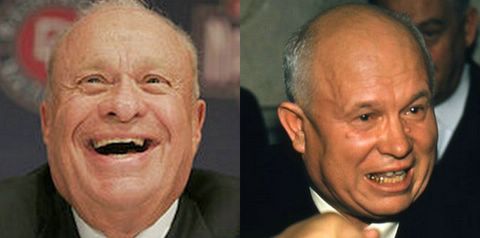 [June 8th] -- So what does Ted Lerner and Nikita Khrushchev have in common, I mean, besides looking like brothers?
[June 8th] -- So what does Ted Lerner and Nikita Khrushchev have in common, I mean, besides looking like brothers?
Well, nothing. I just felt the need to make the inference.
But Lerner could be a communist, I mean, he really could be. I did some research in "The Communist Manifesto," and right there on page 238, is the answer: "Communist doctrine states that underground parking garages are decidedly capitalistic." There you go, proof positive that the Nationals' new owner is a "comrade."
Oh, were it only that easy.
The long hoped for report that the the Lerner family would cover the cost of building those unsightly garages underground will never come. With time having run out, new ownership stated emphatically on Wednesday that building underground parking garages would be too expensive and would create a "timeline problem" in getting the stadium built. So, all those "Ah, the new ownership will pay to have those garages built underground" stories that we bloggers wrote were oh-so-wrong.
When is a parking garage not a parking garage? When it's a metaphor for something else.
The parking garage was the fi rst test of the new ownership group, to see exactly how far they were willing to go in both building and rebuilding this franchise here in Washington. Would they allow the parking garages to blight the sightlines of the new stadium, making our park the antithesis of stadiums in Pittsburgh and St. Louis? Would the pre-cast concrete exterior remain, or would the limestone reappear as a gift from the baseball gods?
rst test of the new ownership group, to see exactly how far they were willing to go in both building and rebuilding this franchise here in Washington. Would they allow the parking garages to blight the sightlines of the new stadium, making our park the antithesis of stadiums in Pittsburgh and St. Louis? Would the pre-cast concrete exterior remain, or would the limestone reappear as a gift from the baseball gods?
And finally, would the roster reflect a mid-size market, or would they invest in "real" ball players, spending "real" money and allow Washington to become a major baseball market after more than a century?
Sadly, the owners have spoken, and it looks like utilitarianism has won out over egalitarianism. No elegance, no uniqueness, no limestone.
In two years, MASN will broadcast that first game at the new park (this is assuming that anyone in D.C. will be able to watch it), and they'll pan their camera over the outfield wall and overlay their graphics on top of the .... parking garages. Pittsburgh has it's bridge, St. Louis has it's arch, and Washington has it's .... parking garages.
Well, it'll be a nice parking garage, right?
NATS WIN, JOHNSON SIGNS, THEORIES ABOUND
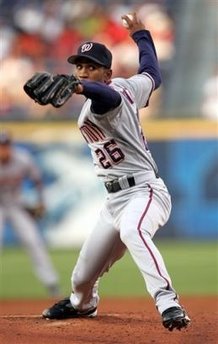 [June 7th] -- I don't get it. A month ago I wrote an article that implored the Washington Nationals to cut their losses and send Ramon Ortiz packing. He was 0-4 at the time and really hadn't been effective in any of his starts.
[June 7th] -- I don't get it. A month ago I wrote an article that implored the Washington Nationals to cut their losses and send Ramon Ortiz packing. He was 0-4 at the time and really hadn't been effective in any of his starts.
Then something interesting happened.
Pitching coach Randy St. Claire suggested that he make a change in his pitching approach, and the veteran actually listened -- and made the change. St. Claire said that, sometimes, the most effective fastball a pitcher can throw is one that isn't his fastest. In other words, by backing off a mile-per-hour or two, a "thrower" can become a pitcher. Since then, Oritz has gone 5-0 and lowered his ERA by almost three runs per game.
Last night, Ortiz pitched another masterful game, allowing six hits and two runs in seven innings. He struck out seven, and continues to strike out many more players with that slower fastball than he did earlier in the season by trying to blow the ball past the batter. Without a doubt, he and Tony Armas Jr. are the reasons that the Nationals are now only six games under .500. It'll be interesting to see if Ortiz ends up on the "trade" list when the new ownership takes over. He has a one year contract, and is pitching very well right now. He would really help a team struggling to make the playoffs, but I don't think he could bring the type of prospect that would help the Nationals. I say keep him and try to sign him to a workable contract.
Okay, on to the Davey Johnson "thing." The Nationals announced on Wednesday that Davey Johnson will be a "consultant" to the team's general manager (notice that they didn't mention Mr. Bowden by name? Hmm...). Bloggers and fans alike are predicting that this was in fact the hiring of the next Nationals' manager. To a man, the posters over at the Ballpark Guys think this is a tremendous move, that Johnson is "just the man" to take the Nationals to the next level.
Well, maybe.
I was hoping that the Nationals were going to do something different, something that seldom happens in major league baseball: give a fresh face a chance. Were the team to be populated next spring by young but talented kids, I had hoped that the manager would be relatively young and equally talented. Davey Johnson is 63, and carries with him as much baggage as he does ability. So this question begs to be asked: if the Nationals are planning rid themselves of a 70 year old curmudgeon, why replace him with someone equally grumpy and almost as old? No, I think that Johnson could be a "plan B;" if whoever the team chooses to run the team, perhaps someone experienced as I mentioned, doesn't fair well, then Johnson would swoop in and take the reigns. And that works for me.
Now it's back home to RFK to take on the Phillies, who are playing very well right now. Although I'm downright giddy about the team's recent play, I'm not fully sold that this incarnation of the team is it's real reflection. But if they can play well against the Phillies, perhaps win two out of three, then I'll be sold.
We'll see.








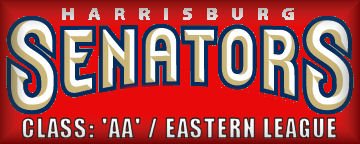
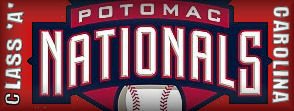

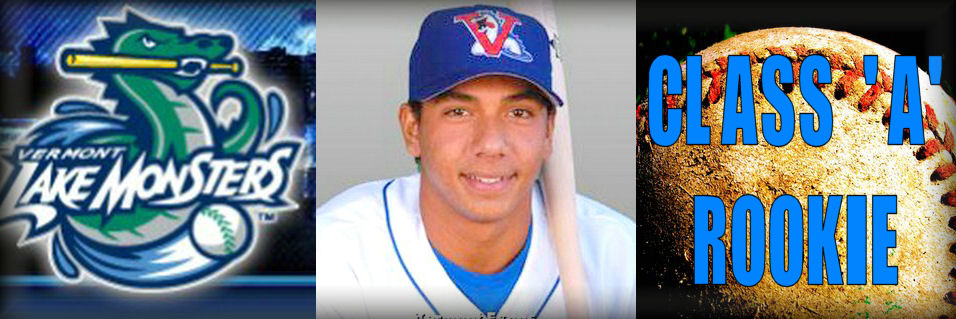











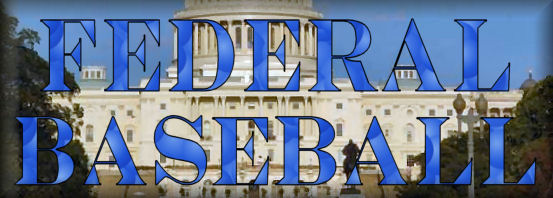



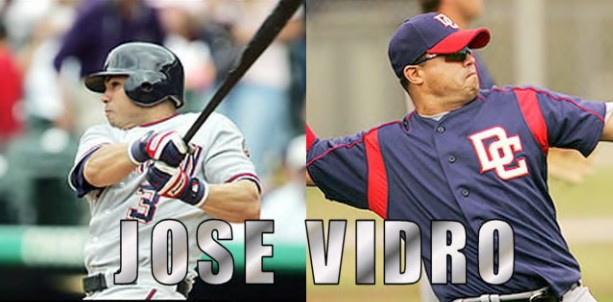




















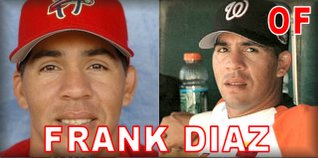

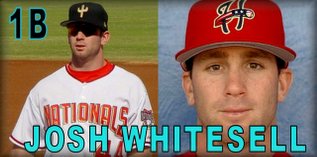
 3) 1926 (road) --- 4) 1936-'37, 1948-'51
3) 1926 (road) --- 4) 1936-'37, 1948-'51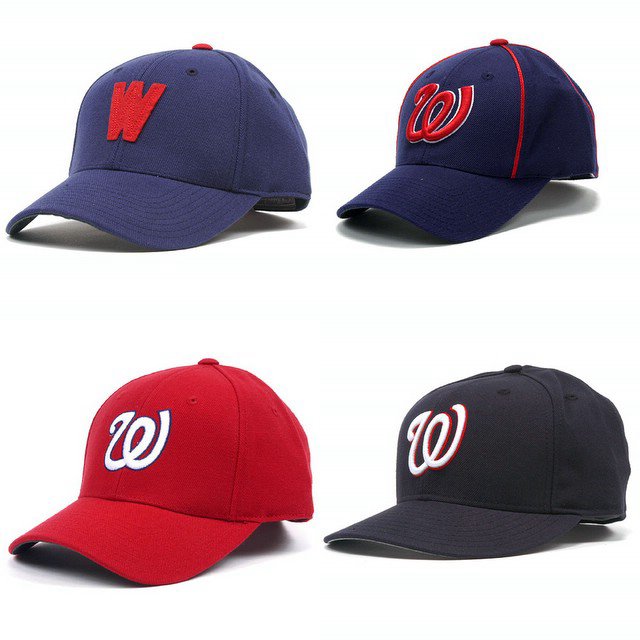 3) 1968 - '71, and 2005 (home) --- 4) 2005 (road)
3) 1968 - '71, and 2005 (home) --- 4) 2005 (road) Buddy Meyer --- Walter Johnson
Buddy Meyer --- Walter Johnson Ed Yost --- Muddy Ruel
Ed Yost --- Muddy Ruel Roger Peckinpaugh --- Joe Cronin
Roger Peckinpaugh --- Joe Cronin Del Unser --- Darold Knowles
Del Unser --- Darold Knowles Ed Stroud - Mike Epstein
Ed Stroud - Mike Epstein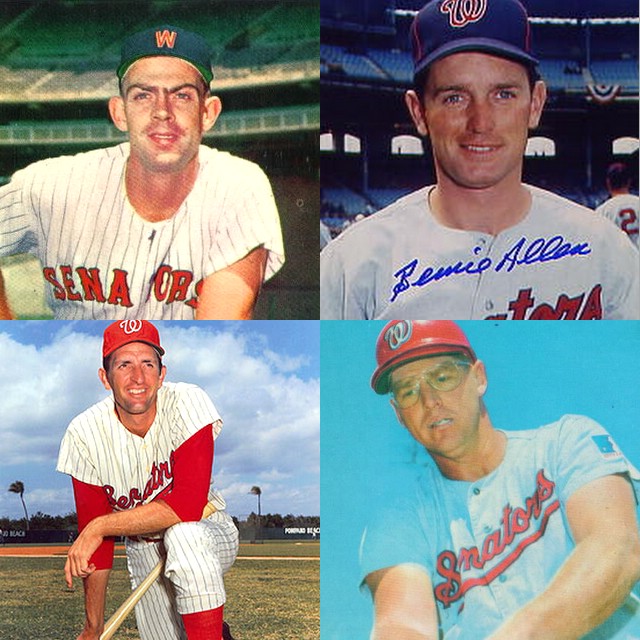 3)1968 -- 4)1969 - 1971
3)1968 -- 4)1969 - 1971